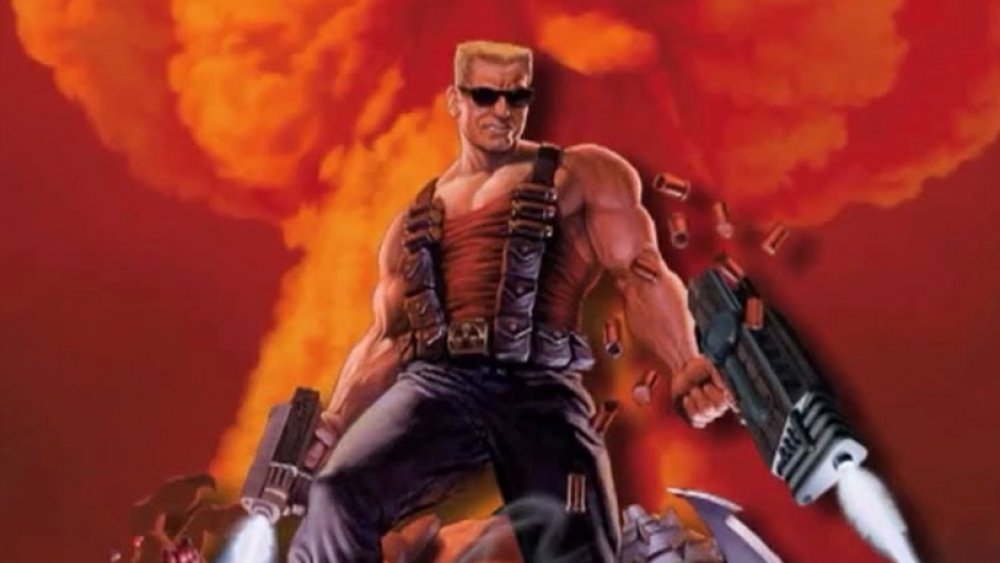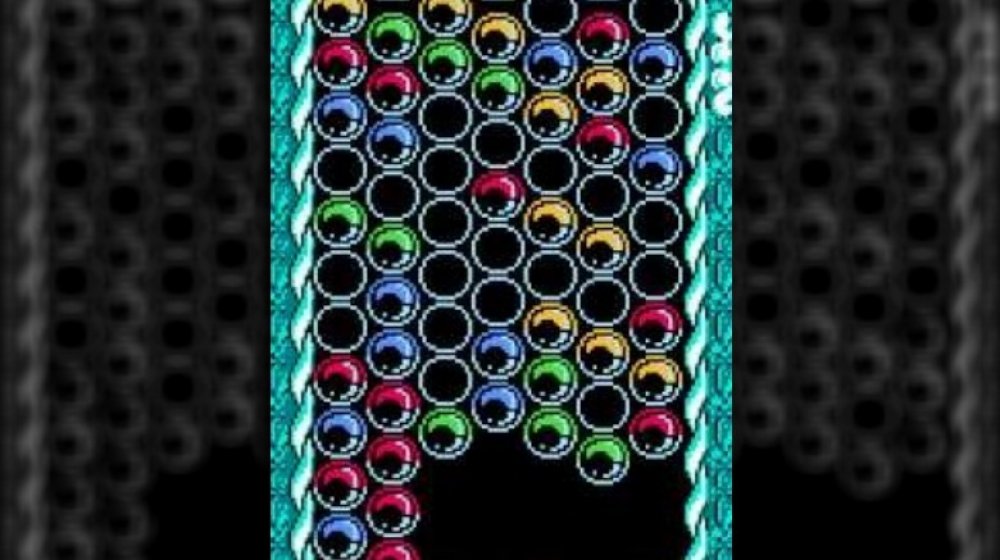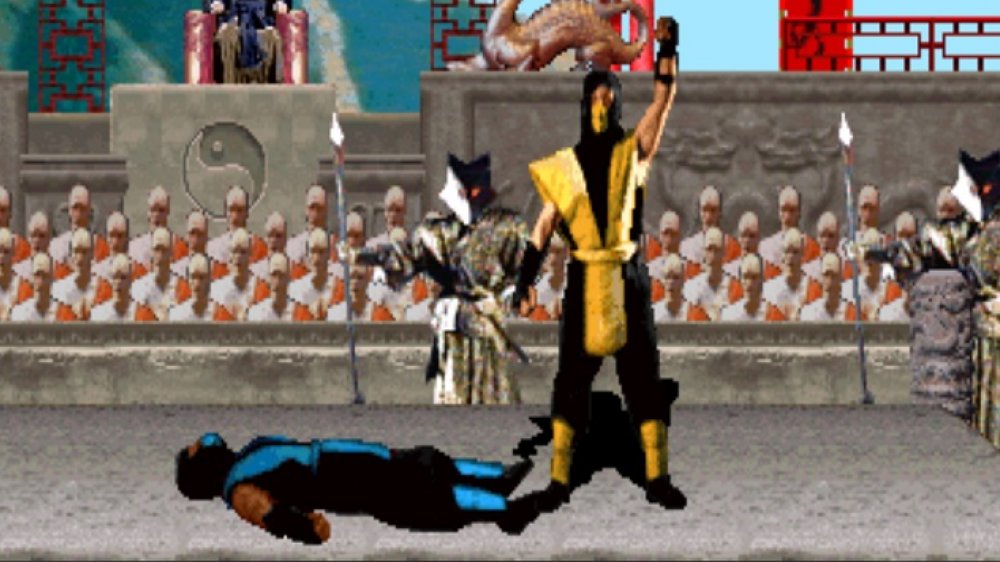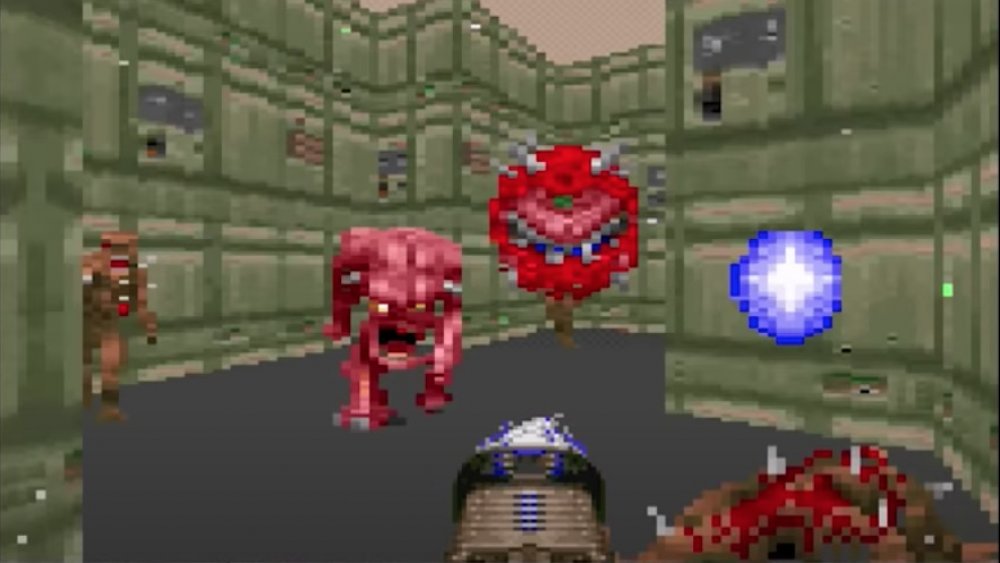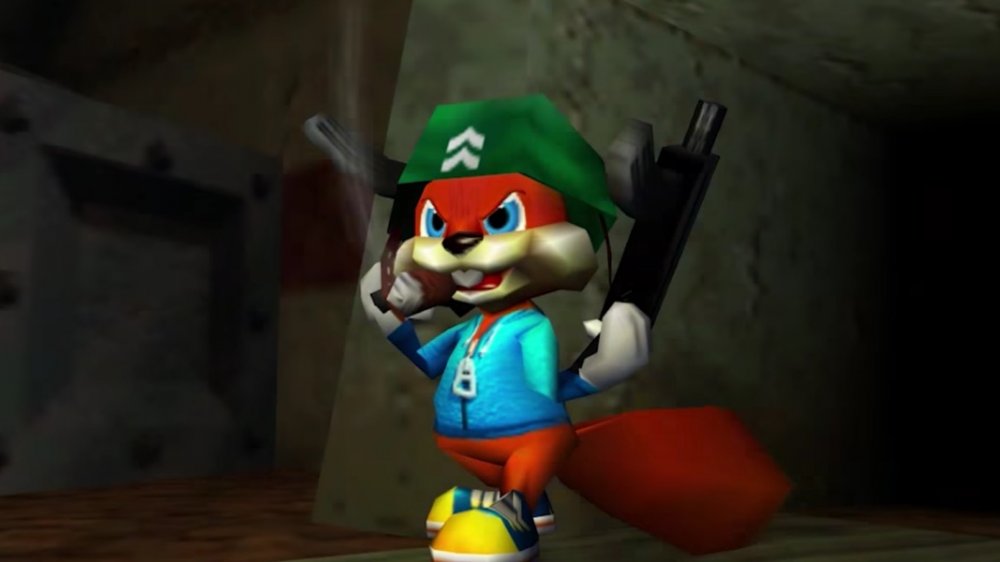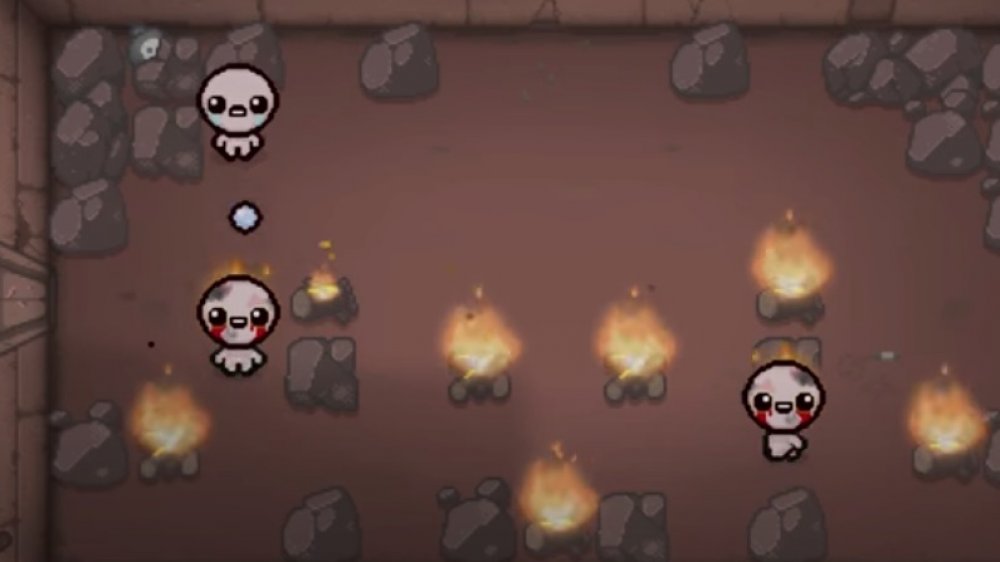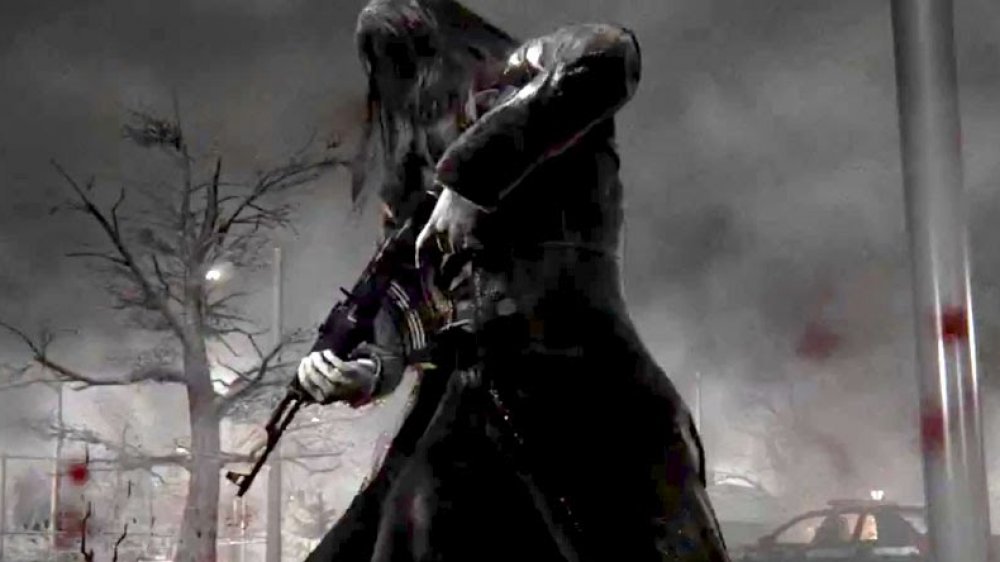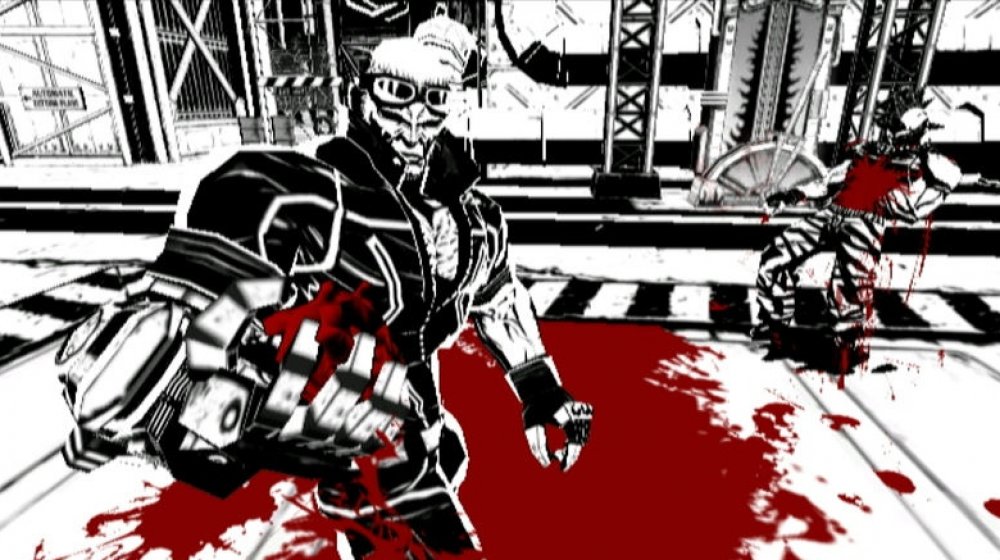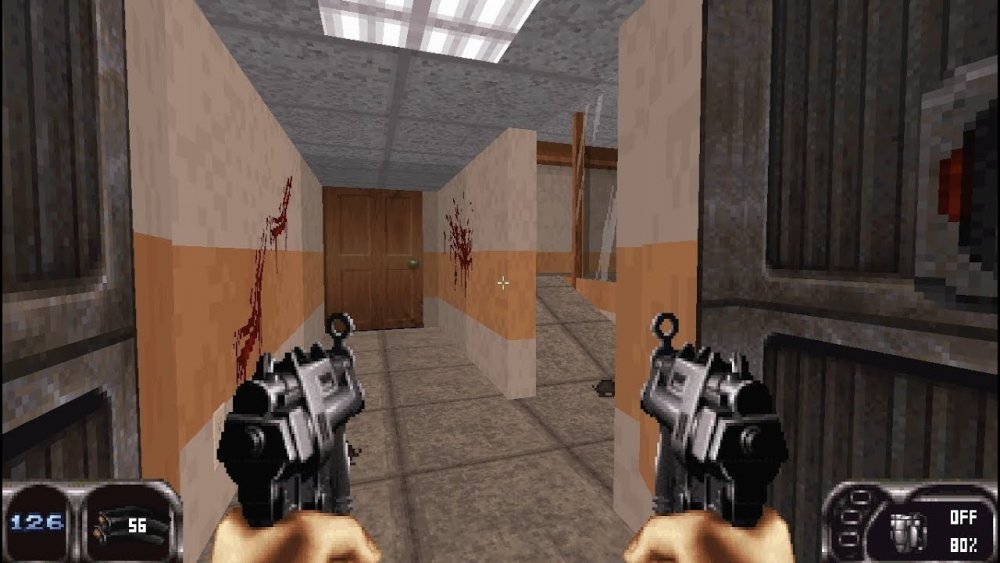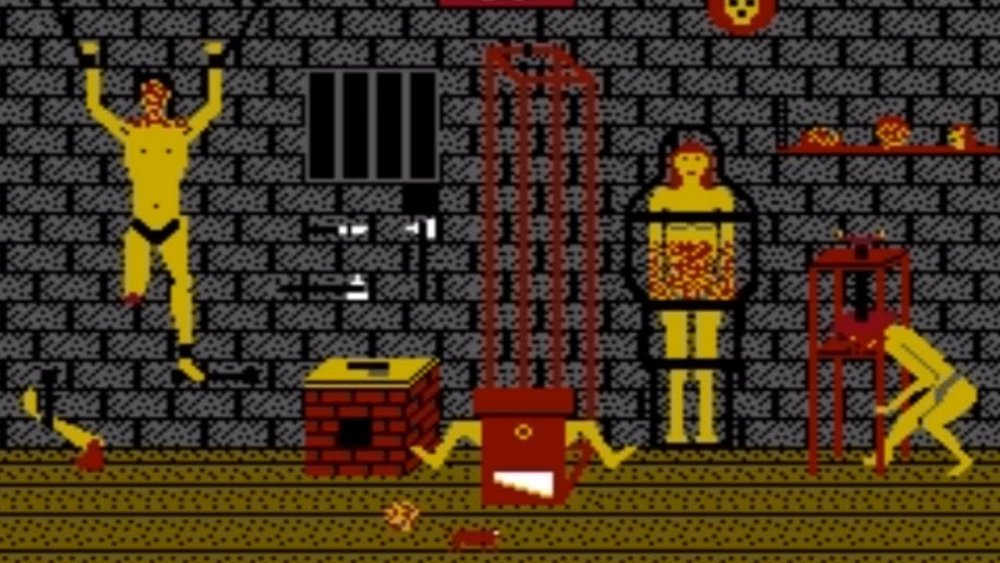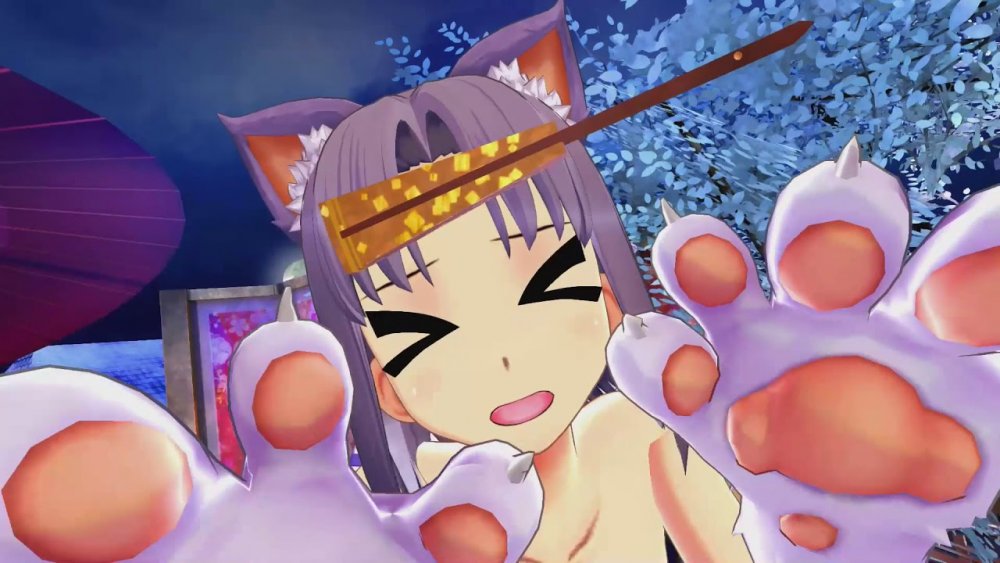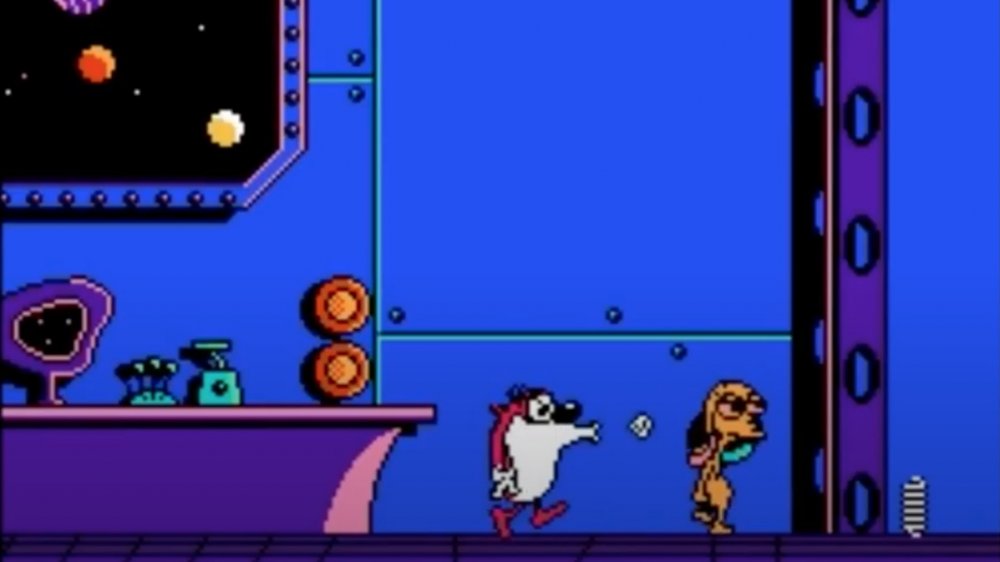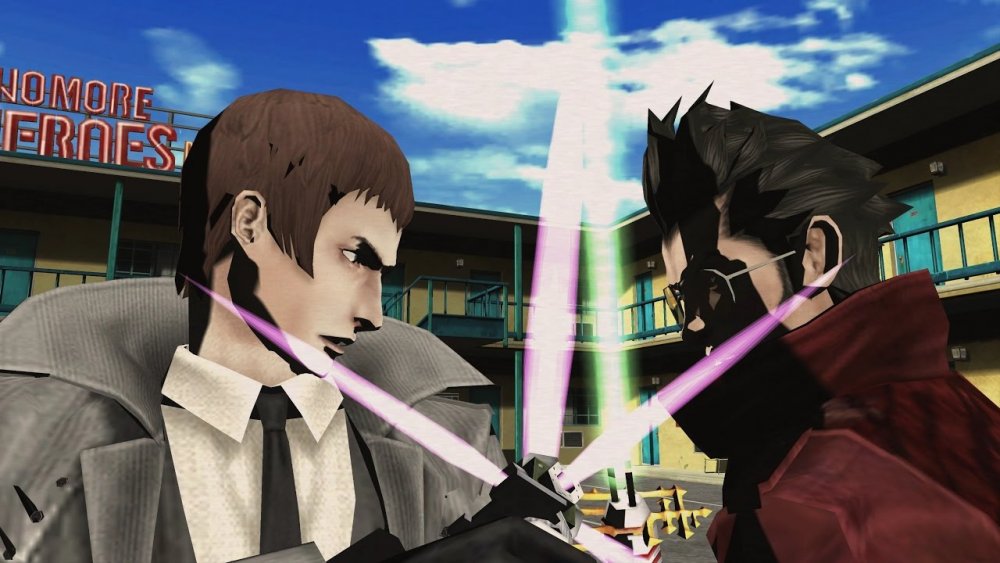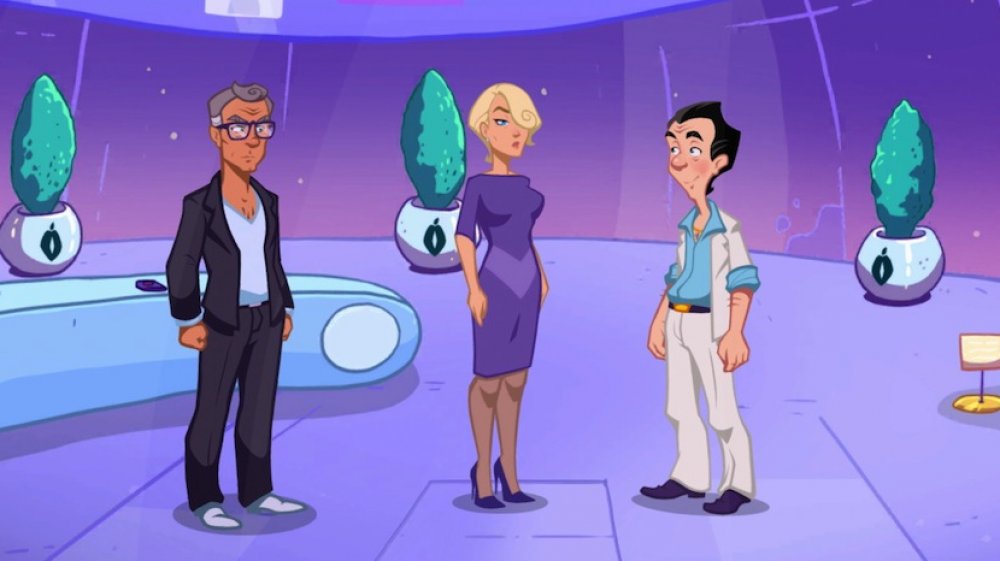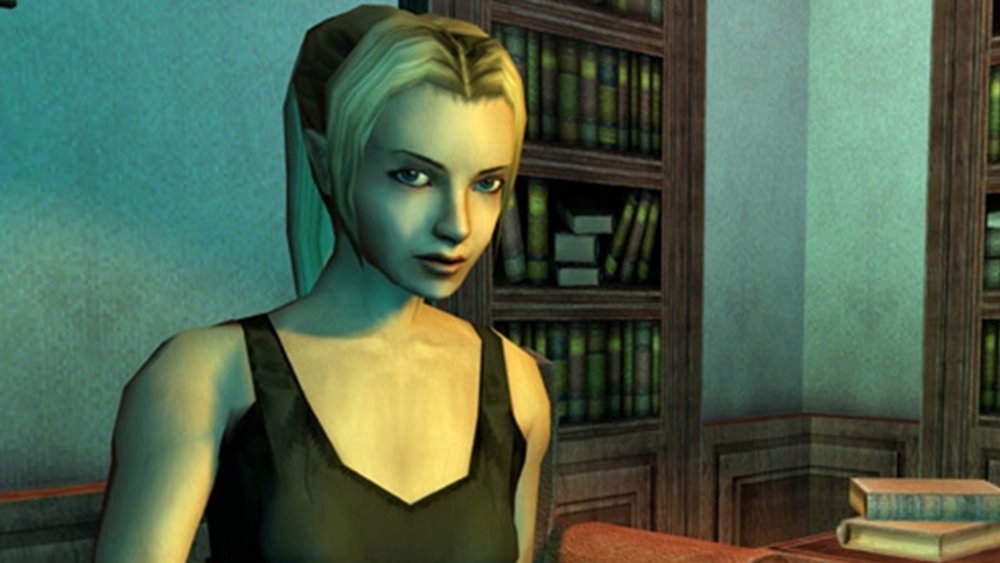Nintendo Games You Should Never Play Around Your Parents
Nintendo: it's practically synonymous with video games. It's also nearly synonymous with family-friendly, wholesome fun. In a way, Nintendo can be seen as the Disney of video games, with Mario as its very own Mickey Mouse. When parents are buying games for their children, there's no safer bet than something with that dependable Nintendo branding. But Nintendo also has a dark side, and it didn't just start with the N64 or even the Super Nintendo.
Indeed, all the way back to the NES, there have been some highly questionable games available for Nintendo systems. And as time goes on, the company has shown it's even more willing to grow up with gamers everywhere. It still remains the safest choice for kids alike, but you might be surprised by what Nintendo will allow on their consoles.
Now get ready to hide your collection — these are the Nintendo games you should never play around your parents.
Bubble Bath Babes
Ah yes, we're starting all the way back to the NES with Bubble Bath Babes. The name alone betrays its devious nature, but it pushes the envelope even further than you might expect. We're talking full-frontal nudity in an NES game. That's right.
Bubble Bath Babes was released by Panesian Games, a company based in Taiwan that was responsible for bringing three pornographic games to the NES. All three were very difficult to obtain at the time for obvious reasons, and as a result, have become valuable collector's items. But you may want to think twice before adding this to your collection!
The game itself is a simple puzzle game reminiscent of Bust-A-Move where you navigate upward floating bubbles to their matching colors. As the game progresses, the 8-bit "bubble bath babes" gradually remove their clothing. You may wonder how such a title made it to the system. The truth is — like so many other questionable games that came to the NES — it was unlicensed.
With plenty of other great, family-friendly puzzle games out there, it's best to pass on this one.
Mortal Kombat
Mortal Kombat made a huge splash in the arcade sector in the early '90s. With revolutionary photo-realism, over-the-top violence, and spine-ripping, heart-grabbing fatalities, this edgy fighting game gave Street Fighter 2 some notable competition. As it continued to gobble quarters in arcades, there was no denying its potential for home console success.
Ported to several systems, including the Super Nintendo, Mortal Kombat stirred controversy as it entered young gamers' homes. Controversial video games were becoming an issue, and concern only grew as this bloodbath of a fighter was made available to the home market. With the console release of Mortal Kombat, congress became involved, pressuring game companies to create a system for rating games so parents could make informed decisions when purchasing a game for their children. From there, the Entertainment Software Ratings Board (ESRB) was born and forever changed the gaming industry.
Removing blood, gore, and toning down fatalities, the Super Nintendo port was far tamer than its arcade counterpart. Regardless, there's no denying this game's place in history for its violent nature. And with digitized actors throwing kicks and punches on your screen, the simulated aggression may be a little too real for a young gamer.
Doom
When you think of first-person shooters, you probably think of Xbox or PC. It's not likely you're running out to buy a Nintendo console for its extensive library of FPS games. But Nintendo has had its fair share, including the most important of its kind: Doom.
It was not the first FPS, but it definitely played an important role in shaping the genre. Released by id Software, Doom was the incredibly successful follow-up to Wolfenstein 3D and let you play as a space marine fighting hell demons on Mars. Doom brought unmatched gore and mayhem along with a rocking soundtrack. And its intense violence was even more troubling after news broke that the shooters involved in Columbine were fans of the game.
An impressive port was released for the SNES, which was an early step into graphic violence for Nintendo, and the series has since found a home on the Switch. Considering the subject and controversy, it's safe to say this is one your parents wouldn't want to see in your Super Nintendo or your Nintendo Switch.
Conker's Bad Fur Day
Conker's Bad Fur Day is one of the most prominent of Nintendo's mature games. To only call it "mature" is, well, a bit of a stretch. It's rude. It's crude. It's lewd. And it's a beloved cult classic for the N64.
Developed by Rare, Conker's Bad Fur Day originated as a typical cutesy video game that failed to impress in its early build. As such, the game's lead artist, Chris Seavor, took inspiration from South Park to create something completely unexpected. The result was dark, vulgar, and a total departure from what you'd expect from a game with such cute visuals.
The story follows an alcoholic squirrel named Conker who goes on a wild journey to rescue his girlfriend. Along the way, he encounters countless wacky characters (including a boss composed of fecal matter), is involved in dangerous scenarios, and ends his journey on a very bleak note. Developers at Rare packed this game with as much foul language, violence, adult themes, and movie references as they could. Conker's Bad Fur Day does everything in its power to earn an M rating, going against all Nintendo once stood to represent.
The Binding of Isaac: Afterbirth+
Imagine playing a game on your Nintendo Switch where you control a child whose mother locked him in a basement as a sacrifice to God. Sounds pretty intense, right? It is.
The Binding of Isaac has humble origins as a Flash game and has since risen to great heights, seeing numerous ports and releases, including Afterbirth+. The game takes a dark, visceral approach in adapting the story of Abraham's sacrifice of his son Isaac. After hearing a request from God, Isaac's mother leaves him for dead in a seemingly endless dungeon-like basement to fight an onslaught of ghoulish, monstrous figures. And what exactly is at his disposal to battle these antagonists? Why, his own tears, of course.
The heavy themes and religious commentary make this a little too advanced for dinner table discussion. In fact, it was initially blocked from the Apple App Store. And while the game is highly regarded — and rightly so — it's better suited for an older audience who can appreciate it beyond the violent, grim setting.
Hatred
The name alone is reason enough to secure this game a spot on the list. Sure, Nintendo's had its fair share of M-rated games, but "Adults Only?" Just two other titles have earned such a rating based purely on their violence factor, making the announcement of its release for the Switch even more surprising.
At the time of this writing, Nintendo has a policy against AO-rated games on its eShop, but Hatred could mark a new era for the seasoned gaming company, barring any major changes or censorship. But even if the content of the game is toned down, it stands to reason a video game that's essentially a "murder simulator" cannot simply be shrugged off. Originally published in 2015, Hatred follows a guy whose only mission is to kill because he hates humanity. The objective is to net the highest body count before your own life ends. Yikes!
It's gratuitous, mean-spirited, and downright "hateful." Hatred was so controversial it was pulled from Steam Greenlight, though it was later returned to the platform. Not only is the game problematic, but it's not even considered good. So think twice before adding this one to your Switch collection.
MadWorld
MadWorld is a brutally violent game that offers players the chance to get especially cruel and creative with their executions. It downplays the brutality of it all with added game modes, where ordinary citizens are used as playthings in a murderous series of challenges. At one time, it was considered the most violent video game ever, and you may be shocked to learn such an honor was given to a Wii exclusive. To make matters worse, the player utilizes Wiimote functionality to play as if they're actually wielding a deadly weapon.
Ars Technica suggests that its exclusivity to the Wii is the more troubling factor, as the console is often viewed as a safe haven for family-friendly titles. Morality groups passionately contested MadWorld's release. Representatives involved in the game's production and distribution defended the project, ultimately arguing that it should be allowed on the market and recognized for what it is. Nintendo essentially left it up to parental discretion, which is why you probably don't want to let your parents catch you playing this one.
Duke Nukem 64
Hail to the king, baby? Maybe not. Duke Nukem is an over-the-top caricature of macho, muscly, gun-toting heroes. Aside from wearing the color red, he's everything Mario isn't.
Duke Nukem 64 is a port of Duke Nukem 3D that does its fair share to censor the original's mature content but fails to make Duke the kind of role model you'll want to emulate. Objectifying women to the point where they are characterized as "babes" for Duke to rescue? This was Nintendo's solution for toning down what was originally an option to kill innocent women who are consumed by alien cocoons. And while this port was able to sidestep the language, religious iconography, and drug references, the violence was unintentionally ramped up to compensate.
Duke Nukem 64 was a wildly successful FPS, and while the character can be seen as a parody of toxic masculinity, Duke himself has not aged well. His ego, love of guns, and treatment of women are all very dated, making Duke Nukem 64 a Nintendo game you should not play in front of your parents.
Chiller
During the NES era, Nintendo was at the height of its wholesome image. Back then, the company so tightly monitored its approved gaming library with the "Nintendo Seal of Quality" that the only way for a game with questionable content to make it onto the system was to slip through the cracks as an unlicensed game.
Chiller is another example of a third party sneaking past the Nintendo censors. Launched in 1986 and ported to the NES in 1990, this Zapper game was gruesome, graphic, and disturbing. While its gore is pixelated, the overall content and design remain unsettling even by today's standards. Going from torture chamber to torture chamber, your objective is to fire upon innocent, immobilized, torture victims. The blood and dismemberment are depicted in eerie detail, allowing the player to really mutilate these shackled prisoners. Cries of pain can be heard, making the experience even more unnerving.
Even though Chiller is unlicensed, it's still shocking to think such a sadistic, unforgivingly graphic game found a home on the friendly NES. You'll definitely want to hide this one from both your parents and Nintendo!
Senran Kagura Peach Ball
The Senran Kagura franchise serves one purpose: to fulfill perverse fantasies involving young, voluptuous female ninjas who bare more skin as they fight. With gameplay somewhat similar to Dynasty Warriors, it makes sense that these games would fall into the hack-and-slash category. Pinball, on the other hand, well — that's a little more peculiar.
Senran Kagura Peach Ball takes a perfectly innocuous game like pinball and throws curvy ninja girls into the mix. And how exactly is this rather bizarre concept that nobody really asked for justified? Well, apparently a scientist creates a potion of sorts that she stores in a local arcade, which doubles as her lab. Her shinobi ninja friends are exposed to the solution, causing them to believe they are animals. The only way to get them back to normal is to bump them repeatedly with a magical peach ball.
Naturally, the peach ball is the size of a pinball, which is how such a concept is shoehorned into the series. As you can imagine, this opens the door for lots of jiggle physics. But before you get any ideas, put this game down! Your parents raised you better than that.
The Ren and Stimpy Show: Buckaroo$!
Oh, joy! Ren and Stimpy was a kids cartoon on Nickelodeon in the early '90s, though it barely passed such a classification. The show constantly pushed the boundaries of what was acceptable programming for children. Packed with tons of potty humor, violence, and even mildly suggestive themes, it's a wonder this show lasted as long as it did on Nickelodeon.
Like any other successful property of its time, Ren and Stimpy received video game adaptations, including The Ren and Stimpy Show: Buckaroo$! This game was made for not just one, but two Nintendo consoles: the NES and SNES. The game's plot is fairly tame, involving a machine invented by Stimpy that generates cash for playing video games. And of course, Ren jumps at the opportunity. You play using both characters through a series of levels inspired by episodes of the show. Not much to it.
While the game itself may appear harmless, the show was under constant scrutiny from censors and — that's right — parents. As such, playing a game based on a very controversial kids show may raise a few eyebrows from your folks — especially if they remember the show from their youth.
No More Heroes
Considering it was a system designed for the whole family, it's always surprising to see violent Wii-exclusive games. No More Heroes is one of the more recent franchises for Nintendo consoles, and when it launched it set out to break the company's wholesome image.
The game follows Travis Touchdown, a sexually repressed, angsty geek who obtains a beam katana and is thus hurled into a quest to compete for the title of top assassin. In this incredibly bloody, highly-stylized action game, you control a protagonist who's not like most video game heroes. Being the typical lonely outsider he is, Travis Touchdown is the type of character that might be a little too relatable, making an action game with this level of bloodshed all the more uncomfortable. His strong lustful desires toward the battle organizer also add a sexually devious element to the game.
And to charge your weapon, you are forced to shake the Wiimote in a way that emulates a lewd gesture, which is mirrored by Travis on your screen. This highly suggestive imagery is not unintentional, and in a way, could be seen as visual evidence that this is not a game intended for kids.
Leisure Suit Larry: Wet Dreams Don't Dry
If there is one game franchise far outside Nintendo's wheelhouse, it's Leisure Suit Larry. First released by Sierra in 1987, Leisure Suit Larry in the Land of the Lounge Lizards marked the beginning of a seedy point-and-click adventure series where the protagonist's sole mission is sexual conquest. The first entry performed poorly due to a lack of retailers willing to distribute on the grounds of its mature nature. But that didn't stop Larry, as the game went on to find growing success based on word of mouth.
Many games in the series have since been released, with an entry weaseling its way onto the Nintendo Switch. This installment finds the not-so-likable Larry back at it yet again, only this time his 1980s sensibilities are challenged by 21st century standards. He must conquer dating on the digital front, which presents a whole new set of challenges for the character.
With a subtitle that's NSFW, you may just want to refer to this one as "Leisure Suit Larry for the Switch." Or perhaps pass altogether, if you're worried what your parents might think.
Eternal Darkness: Sanity's Requiem
Of course, it's not always violence, nudity, or language that makes a game inappropriate for young audiences. The psychological horror game Eternal Darkness: Sanity's Requiem for the GameCube preys on fear. It sets out to blur the line between the real world and the game world, causing players to question their own sanity.
Eternal Darkness: Sanity's Requiem follows ordinary people who are at the mercy of mysterious, ruthless, evil gods. Their attempts to escape and fight back are futile, but each person who faces these dark forces has their story imprinted in the "Tome of Eternal Darkness," which gradually builds upon a greater hope for freedom.
The game involves numerous puzzles and keeps track of your character's sanity throughout her journey. This sanity meter will impact how you progress, creating tense audio and visual cues. The effects grow in severity as your sanity decreases to the point where they are no longer limited to in-game events. From a controller error message leaving you helplessly at the mercy of your enemies to the TV shutting itself off while menacing sounds continue, by the time you're finished, you may wonder whether it's the character who's lost her mind, or you.

